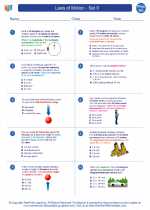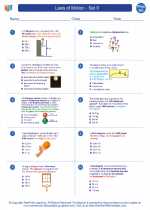Ionizing Radiation
Ionizing radiation is a form of radiation that has enough energy to remove tightly bound electrons from atoms, creating ions. This can lead to harmful effects on living organisms and materials. It includes high-energy electromagnetic waves (such as X-rays and gamma rays) and particulate radiation (such as alpha and beta particles).
Types of Ionizing Radiation
There are several types of ionizing radiation:
- Alpha Particles: These are positively charged particles consisting of two protons and two neutrons. They are emitted by some radioactive materials such as uranium and can be stopped by a sheet of paper or clothing.
- Beta Particles: These are high-energy, high-speed electrons emitted by certain types of radioactive atoms. They can penetrate living tissue but can be stopped by a layer of clothing or a few millimeters of a substance such as aluminum.
- X-Rays: These are high-energy electromagnetic waves with a shorter wavelength than visible light. They can penetrate most solid materials and are used in medical imaging and industrial applications.
- Gamma Rays: These are high-energy electromagnetic waves emitted by radioactive decay. They are similar to X-rays but have even higher energy and can penetrate through the human body and most materials.
Health Effects
Exposure to ionizing radiation can have harmful effects on human health, including increased risk of cancer, radiation sickness, and genetic mutations. The severity of these effects depends on the type of radiation, the dose received, and the duration of exposure.
Protection and Safety Measures
There are several safety measures to protect against ionizing radiation:
- Use of shielding materials such as lead or concrete to block or absorb radiation.
- Maintaining a safe distance from radiation sources.
- Using proper protective equipment such as lead aprons and gloves in medical and industrial settings.
- Adhering to safety guidelines and regulations when working with ionizing radiation.
Study Guide
When studying ionizing radiation, it is important to understand the following key concepts:
- The difference between ionizing and non-ionizing radiation.
- The types of ionizing radiation and their properties.
- The health effects of ionizing radiation and the concept of radiation dose.
- The safety measures and protective strategies against ionizing radiation.
- The applications of ionizing radiation in various fields, such as medicine and industry.
It is also helpful to practice solving problems related to radiation dose, shielding effectiveness, and safety calculations.
Remember to always follow safety guidelines and regulations when working with ionizing radiation, and seek guidance from qualified professionals when conducting experiments or handling radioactive materials.
.◂Physics Worksheets and Study Guides High School. Laws of Motion - Set II

 Worksheet/Answer key
Worksheet/Answer key
 Worksheet/Answer key
Worksheet/Answer key
